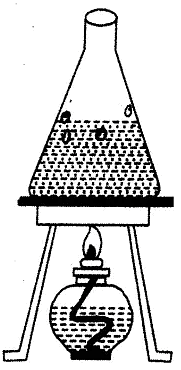NCERT Solutions for Class 6 Science - Air Around us
Q1. What is the composition of air?
Ans: Air contains some gases mainly nitrogen, oxygen, small amount of carbon dioxide, water vapour and dust particles.
Q2. Which gas in the atmosphere is essential for respiration?
Ans: Oxygen in the atmosphere is essential for respiration.
Q3. How will you prove that air supports burning?
Ans:
Step I: Two shallow containers are taken and burning candles are fitted into it.
Step II: Now, water is filled in the container at two different levels.
Step III: Both the candles are then covered with glass.
Step IV: After sometimes, we observed that the candles having less water in its container lights off.
This happened because the container having more water contains more oxygen and therefore it burnt for more time. Thus, it is proved that air supports burning.
Q4. How will you show that air is dissolved in water?
Ans: Take some water in a glass vessel or beaker. Heat it slowly on a tripod stand. Look carefully at the inner surface of the vessel, before reaching its boiling point, the bubble of air start rising from bottom to surface. These bubbles come from the air dissolved in water.
Q5. Why does a lump of cotton wool shrink in water?
Ans: A lump of cotton wool has a lot of air trapped inside the space present in its fibers. When this lump of cotton is immersed in water, all the air is replaced by water. Due to this, the cotton lump shrinks down.
Q6. The layer of air around the earth is known as _______.
Ans: The layer of air around the earth is known as the atmosphere. Atmosphere consists of various gases such as Nitrogen, Oxygen, etc.
Q7. The component of air used by green plants to make their food, is _______.
Ans: The component of air used by green plants to make their food, is carbon dioxide.
The oxygen in air is used by the organisms present in air, water or soil or on earth for their respiration. During respiration carbon dioxide gas is released to air. But green plants during photosynthesis use carbon dioxide of air for preparing food and they release oxygen gas in the air.
- Natural sources of carbon dioxide include most animals, which exhale carbon dioxide as a waste product.
- Human activities that lead to carbon dioxide emissions come primarily from energy production, including burning coal, oil, or natural gas.
Q8. List five activities that are possible due to the presence of air.
Ans: The five activities that are possible due to air are as follows:
- Photosynthesis
- Cloud formation
- Respiration
- Transpiration
- Winnowing
Q9. How do plants and animals help each other in the exchange of gases in the atmosphere?
Ans: Plants take in carbon dioxide in during photosynthesis give out oxygen in the atmosphere while animals take in oxygen and breathe out carbon dioxide during respiration. In this way, plants and animals help each other in the exchange of gases in the atmosphere.
|
100 videos|261 docs|49 tests
|
FAQs on NCERT Solutions for Class 6 Science - Air Around us
| 1. What is air and why is it important? |  |
| 2. How is air polluted and what are the main sources of air pollution? |  |
| 3. What are the effects of air pollution on human health? |  |
| 4. How does air pollution impact the environment? |  |
| 5. What are some measures to reduce air pollution? |  |

|
Explore Courses for Class 6 exam
|

|


















